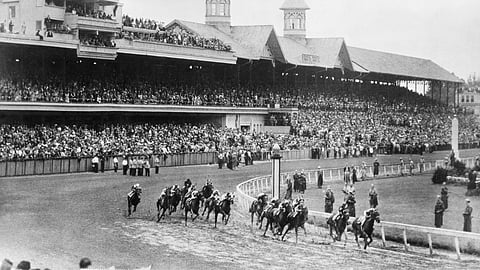

Imagine that you're at the track, on a beautiful, breezy, sultry summer afternoon. You're hanging at the rail, watching the horses stepping onto the track from the paddock, and enjoying your place in the cosmos at that particular moment. You've placed a bet in on a horse you think has a very good chance, and even better, he’s 20-1. You start daydreaming as you stand there: you imagine your horse making a move on the outside at the top of the stretch, threatening the tiring leaders, and as the field turns for home, you can hear the hoofbeats and the rising cheer of the crowd, and you imagine how would begin to get excited, hitting your leg with your program and starting to cheer, quietly at first, and then louder as the horses get closer, and you realize your pick has a chance at winning. "Come on with the 3!"
All of a sudden, you are shaken out of your reverie by an enormous thunderclap. You look up to the sky, and black clouds have appeared out of nowhere, and they mean business. There is more thunder, then lightning, and then the skies open: people in the crowd run for cover, the rain comes down so hard that it starts running off the track in rivulets, and then, BOOM!, lightning strikes so close that the hair on your arms stands on end. You run for the cover of the grandstand.
A minute later, track management has determined that because of the weather conditions, the race cannot be run safely, so it has been cancelled. The horses are sent back to the barns, and all wagers are refunded .You shake the water out of your hair, and head to the window, a little disappointed: you didn't get the thrill of watching your bet play out, but at least you got your money back.
Now imagine an alternate scenario: instead of refunding all bets, the track announcer states that the race will be rerun in four months, and that the track will "honor" the bets at that time, which means the track holds onto all the money in the betting pools until the race is run. Your horse may not even make the race -- he could get hurt, get retired, get shipped to Timbuktu -- but if your horse does not win the race, even if he does not even make the field, your bet is determined to be a loser.
This is the inexcusable and outrageous decision that Churchill Downs has made with the Kentucky Derby future wager. While moving the Kentucky Derby from May to September is a decision that is not only understandable, but worthy of praise -- these are unprecedented times, and as a nation we must everything we can do keep people safe, and that includes cancelling large-scale public events like the Derby -- there is no excuse for their incomprehensible decision to carry all monies bet in the Derby future pools to the race in September.
Three-year-olds in September are vastly different than they are in September, and any handicapper worth her salt would almost certainly bet differently on a 3-year-exold race in the fall than one in the spring. To Churchill Downs, which has held three rounds of Derby future bets, in November, February, and March, this doesn't matter: they're going to hold that money for an additional four months, accruing interest while it sits, and apply it to a new race, regardless of whether the bettors would have bet differently, or not bet at all, had they known the race would be moved from May to September.
If a racetrack cancelled the last race on a card, but refused to refund all wagers in that race, horseplayers would probably tear down the grandstand, with their bare hands if necessary, before the sun set, and that would be a pretty justifiable response. On the other hand, on Churchill's unconscionable decision to hold onto bettors’ money for a third of a year because... well, because they can, we hear nary a peep from the racing media. This is a perfect example of why people claim that the people in management positions in horse racing do not understand bettors, with the presumption that this lack of understanding stems from the fact that most of the people who run the sport do not themselves bet.
Horse racing has many complicated issues, problems that lack easy solutions and are difficult to fix, but this is not one of them. There is only one acceptable decision here: call the race a scratch and give the money back -- all of it -- to the bettors.